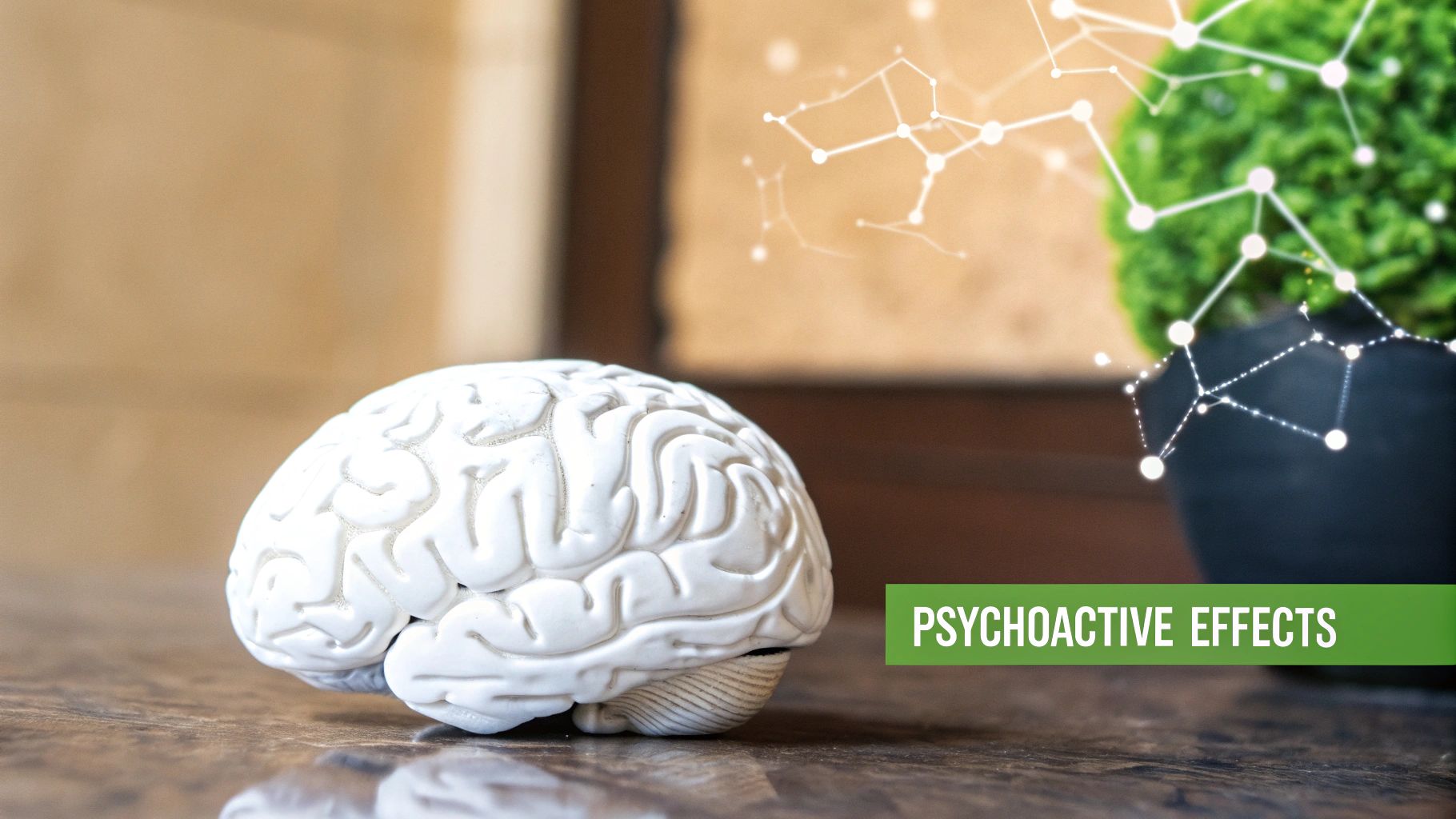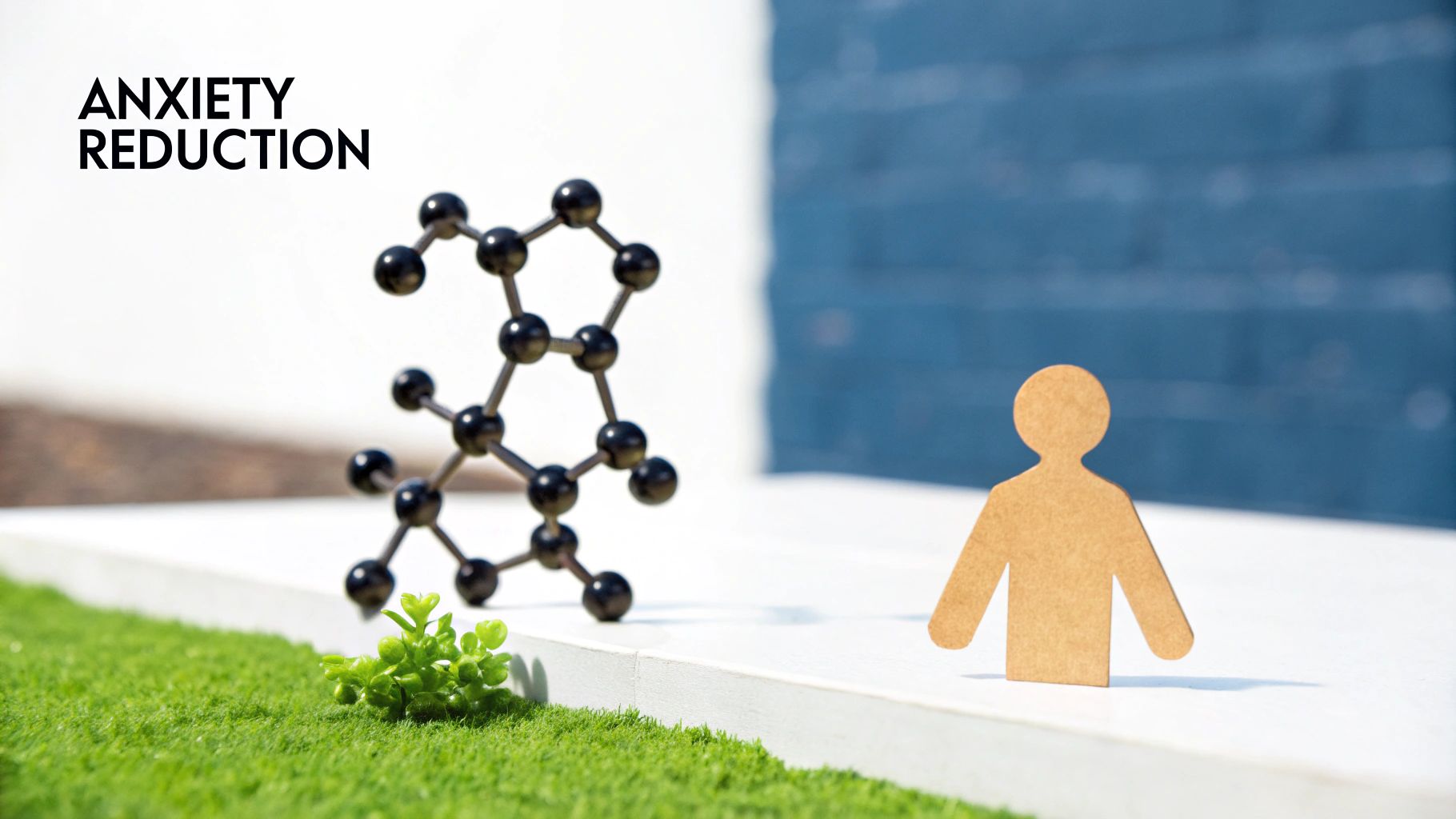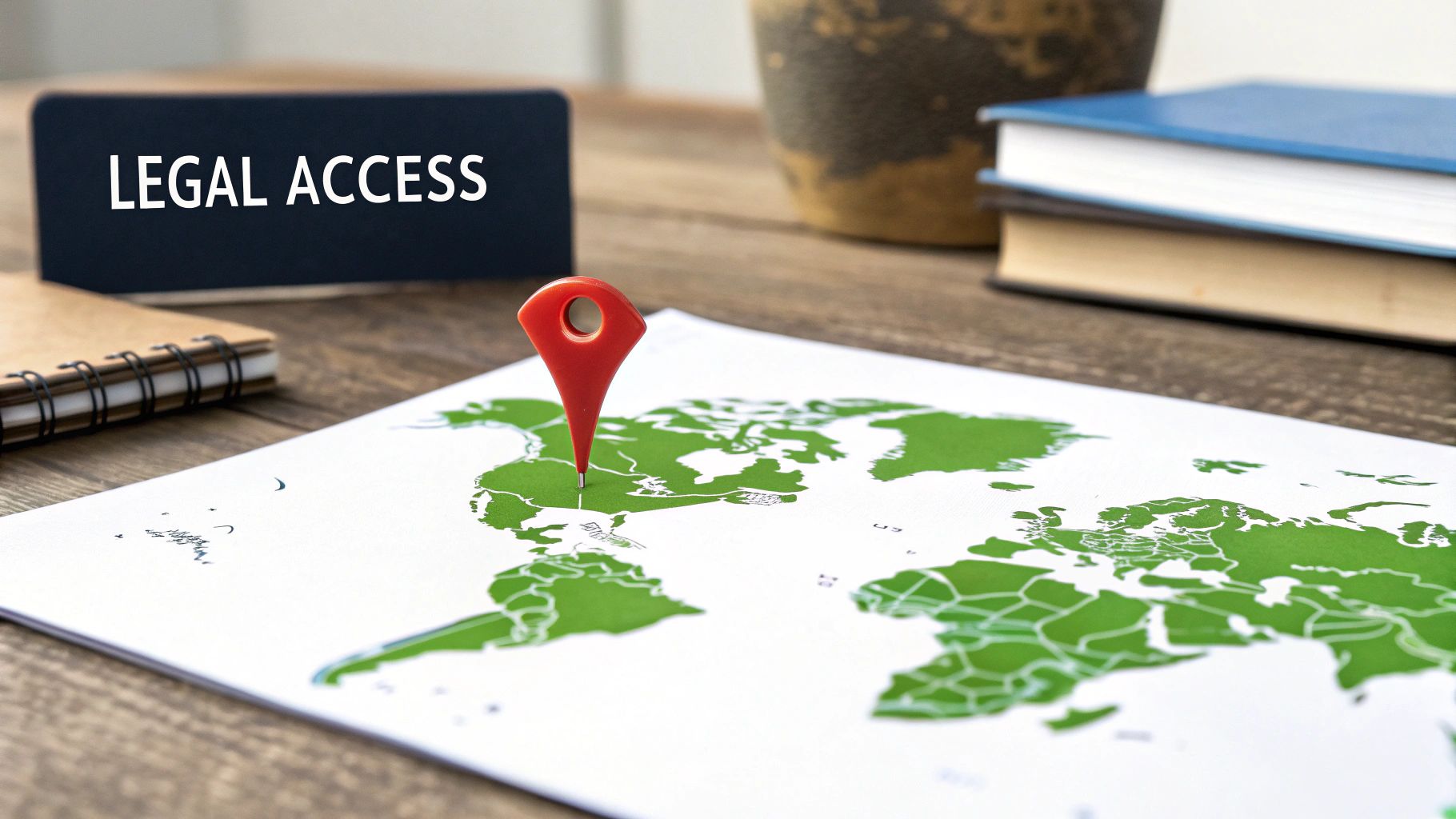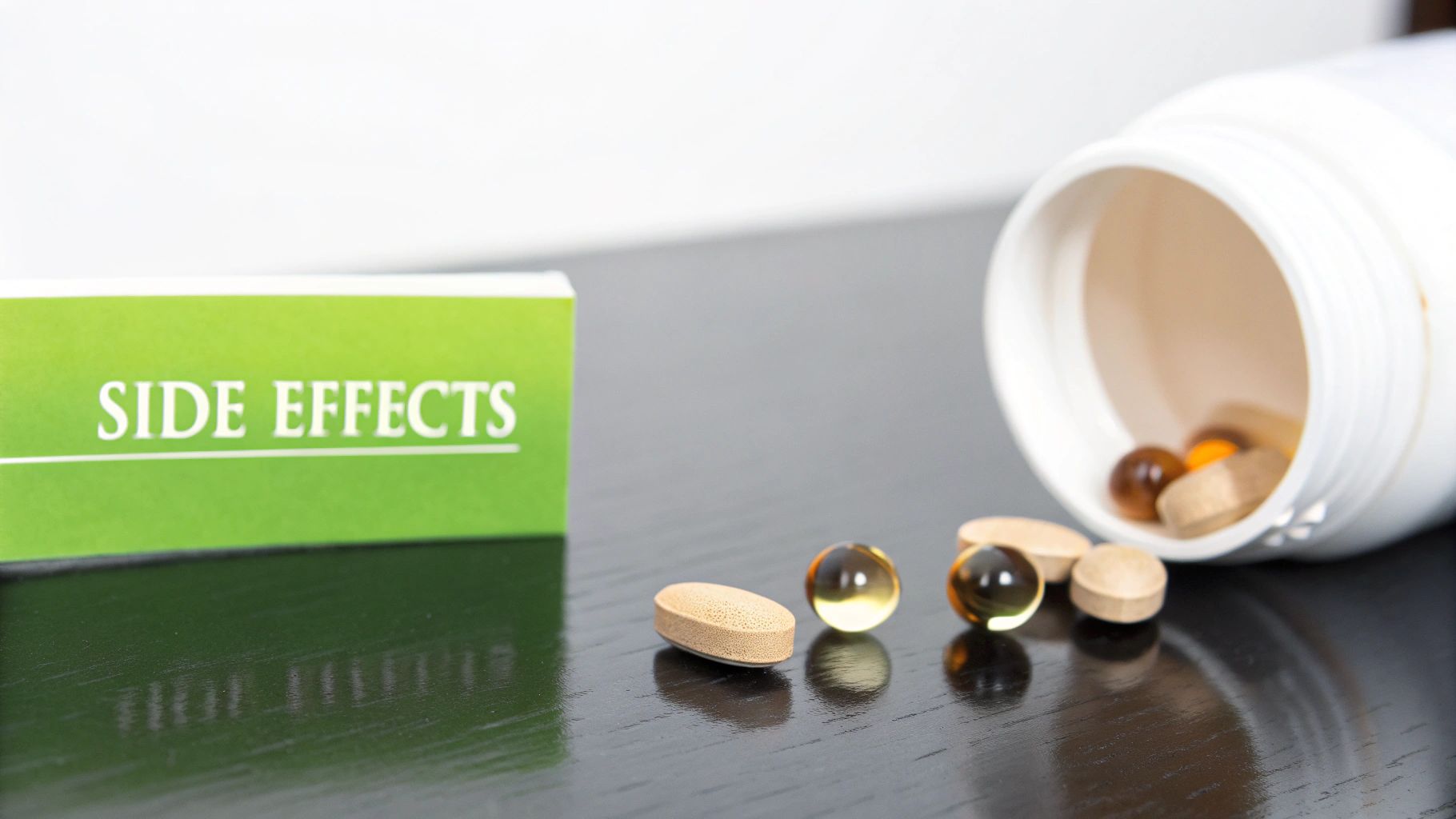Understanding CBD and THC for Anxiety Management
This listicle clarifies the differences between CBD vs THC for anxiety management. Living in Chilliwack, BC, gives you access to various cannabis products, but choosing the right one requires understanding their distinct effects. We'll cover six key aspects of CBD vs THC: psychoactive effects, anxiety reduction mechanisms, legal status and accessibility, side effects, research support, and dosage/administration. This information empowers you to make informed decisions about using cannabis for anxiety relief.
1. Psychoactive Effects
When comparing CBD vs THC for anxiety, the most significant difference lies in their psychoactive effects. THC (tetrahydrocannabinol) is the primary psychoactive compound in cannabis, responsible for the "high" sensation. This altered state can involve changes in perception, mood, and consciousness. Conversely, CBD (cannabidiol) is non-psychoactive, meaning it doesn't impair cognitive function or produce euphoria. This distinction is crucial for individuals seeking anxiety relief without experiencing the intoxicating effects of THC.

At a molecular level, THC binds directly to CB1 receptors in the brain, triggering the psychoactive effects. CBD, on the other hand, interacts with the endocannabinoid system (ECS) without directly binding to CB1 receptors. It modulates the ECS, influencing various physiological processes, including anxiety regulation, without the intoxicating effects. THC's psychoactive properties are primarily attributed to Delta-9-THC. To understand this compound in more detail, check out this comprehensive guide on what is Delta 9 THC.
For those in Chilliwack, BC, seeking cannabis products for anxiety, understanding these differences is paramount. Many workplace-friendly CBD products available in local cannabis retail stores emphasize their non-psychoactive nature. This allows individuals to manage anxiety throughout the day without compromising cognitive function or performance. Medical cannabis programs often recommend high-CBD, low-THC products for anxiety patients who need to maintain functionality.
Pros:
- CBD: Allows anxiety treatment without impairment of daily activities.
- THC: May provide immediate distraction from anxiety for some users.
Cons:
- THC: Can increase anxiety and paranoia in some individuals, impairs cognitive function and motor skills, and its psychoactive effects may be undesirable in professional settings.
- CBD: Its non-psychoactive nature means some users don't feel immediate effects.
Tips for Cannabis Users in Chilliwack, BC:
- Start with CBD: If maintaining cognitive function during the day is important, begin with CBD products. Numerous options are available at local cannabis retailers.
- Low THC Doses: If considering THC for anxiety, start with very low doses to assess your individual reaction and minimize potential negative effects.
- Consider Daytime CBD & Evening THC (if beneficial): Use CBD for daytime anxiety management and THC (only if you find it beneficial and tolerate it well) for evening use when cognitive impairment is less of a concern.
This difference in psychoactive effects makes the "CBD vs THC for anxiety" discussion essential. It empowers individuals to choose the approach best suited to their needs and lifestyle, especially in a context like Chilliwack, BC, where cannabis use is increasingly prevalent.
2. Anxiety Reduction Mechanisms
Understanding how CBD and THC differently impact anxiety is crucial for choosing the right product for your needs. Both compounds interact with the body's endocannabinoid system (ECS), a complex network of receptors and neurotransmitters that regulate various functions, including mood, sleep, and pain. However, their distinct mechanisms of action explain why they can have opposite effects on anxiety in some individuals. This makes exploring these mechanisms a critical step in deciding between CBD vs THC for anxiety.

CBD primarily interacts with the ECS indirectly. It enhances serotonin signaling, a key neurotransmitter involved in mood regulation, by acting on 5-HT1A receptors. It also inhibits the enzyme FAAH, which breaks down anandamide, leading to increased levels of this natural mood-boosting endocannabinoid. Further, CBD may reduce the activity of the amygdala, the brain region associated with processing fear and anxiety, in response to anxiety triggers. This multifaceted approach makes CBD a valuable option for managing anxiety through several pathways simultaneously.
THC, on the other hand, directly activates CB1 receptors, the same receptors targeted by anandamide. This direct action can lead to rapid anxiety reduction at appropriate doses for some individuals. However, this effect is biphasic, meaning different doses can produce different outcomes. While low doses may alleviate anxiety, higher doses can overstimulate CB1 receptors and potentially exacerbate anxiety.
Pros:
- CBD: Subtler, more sustainable anxiety relief; addresses anxiety through multiple pathways.
- THC: Can provide rapid anxiety reduction at appropriate doses.
Cons:
- CBD: Effects can take longer to manifest than THC; individual responses vary.
- THC: Can increase anxiety at higher doses; individual responses vary.
Examples of Successful Implementation:
Research consistently demonstrates the potential of CBD for anxiety relief. Studies show CBD reduced anxiety in public speaking tests, and clinical trials have shown its efficacy in reducing the severity of PTSD symptoms, which often include significant anxiety. While THC's effectiveness for anxiety is more dose-dependent and variable, some individuals find relief at lower doses, particularly when combined with CBD.
Tips for Chilliwack, BC Cannabis Users:
- Start Low and Go Slow: Track your response to different dosages of both CBD and THC to find your optimal therapeutic window. This is especially important given the biphasic nature of THC's effects.
- Combine with Other Practices: Consider integrating CBD or low-dose THC with other anxiety-reducing practices like meditation, yoga, or spending time in nature.
- Consider the Entourage Effect: For some individuals, a small amount of THC combined with CBD can produce greater anxiety relief than either compound alone, a phenomenon known as the "entourage effect." This concept was pioneered by researchers like Dr. Ethan Russo and built upon the foundational cannabis research of Dr. Raphael Mechoulam.
- Consult with a healthcare professional: Before incorporating cannabis products into your anxiety management plan, consult with a healthcare professional, especially if you are taking other medications.
This item deserves its place on the list because understanding the different mechanisms of CBD and THC is fundamental to making informed choices about cannabis for anxiety. By recognizing the distinct ways these compounds interact with the ECS, individuals in Chilliwack and beyond can better navigate the various cannabis products available and personalize their approach to anxiety management.
3. Legal Status and Accessibility
When considering CBD vs THC for anxiety, understanding the legal landscape is crucial, especially for residents of Chilliwack, BC, and other parts of Canada. The legality of these compounds dictates their accessibility, impacting which options are realistically available for managing anxiety. This factor alone can heavily influence a patient's treatment choices, making it a critical aspect of the CBD vs THC discussion.

In Canada, both CBD and THC are legal for medical and recreational purposes. This is thanks to the Cannabis Act of 2018, which legalized cannabis nationwide. However, specific regulations, such as possession limits and permitted locations for consumption, are determined at the provincial level. In British Columbia, including Chilliwack, adults can legally purchase and possess cannabis, including products containing both CBD and THC, from licensed retailers. While this generally simplifies access, understanding BC's specific cannabis laws remains important.
Features of Canada's Legal Cannabis Framework:
- Federal Legality: Both CBD and THC are federally legal under the Cannabis Act.
- Provincial Regulation: BC regulates specific aspects like retail sales and public consumption.
- Licensed Producers: Cannabis products are sourced from licensed producers regulated by Health Canada.
- Medical Access: Patients can access cannabis for medical purposes with a prescription.
Pros of Legal Access in Canada:
- Wider Availability: Legalization allows Canadians greater access to both CBD and THC products for anxiety.
- Quality Control: Health Canada's regulations ensure licensed producers meet stringent quality and safety standards.
- Product Variety: Consumers can choose from a wide range of products with varying CBD and THC ratios to suit individual needs.
- Reduced Stigma: Legalization has contributed to reducing the stigma surrounding cannabis use, making it easier for individuals to seek information and treatment options.
Cons Related to Legality (Even in a Legal Market):
- Cost: Legal cannabis can be expensive, potentially posing a barrier for some consumers.
- Varying Provincial Regulations: Navigating the different provincial rules can be confusing for consumers.
- Limited Research (Specifically Canadian Context): While research is ongoing, more Canadian-specific research on the effectiveness of different CBD and THC ratios for anxiety is needed.
Examples of Legal Cannabis Products in Canada:
- CBD Oils and Capsules: Available with varying CBD concentrations and minimal THC.
- THC-dominant Dried Flower: Available for smoking or vaping.
- Balanced CBD/THC Products: Offer the potential benefits of both compounds.
- Edibles and Beverages: Provide alternative consumption methods.
Tips for Chilliwack, BC Residents:
- Consult a Healthcare Professional: Discuss your anxiety and potential use of CBD or THC with your doctor.
- Visit a Licensed Retailer: Purchase cannabis products from a licensed retailer in Chilliwack to ensure quality and legality.
- Start Low and Go Slow: Begin with a low dose of CBD or THC and gradually increase as needed to find the optimal dose for your anxiety.
- Understand Local Regulations: Be aware of BC's specific rules regarding cannabis possession and consumption.
The legality of cannabis in Canada provides an opportunity for individuals in Chilliwack, BC, and across the country to explore the potential benefits of both CBD and THC for anxiety. By understanding the regulations and seeking guidance from healthcare professionals and licensed retailers, individuals can make informed decisions about using these compounds to manage their anxiety.
4. Side Effect Profiles
When considering CBD vs THC for anxiety, understanding their distinct side effect profiles is paramount. Choosing the right cannabinoid depends heavily on your individual sensitivity and desired effects. Making an informed decision about which compound, or combination of compounds, best suits your needs involves weighing the potential benefits of anxiety relief against the possibility of unwanted side effects. This careful evaluation will help you maximize therapeutic benefits while minimizing potential risks.

CBD generally boasts a favorable safety profile, even at high doses, with reported side effects typically mild. These may include fatigue, diarrhea, or changes in appetite/weight. Conversely, THC can produce more pronounced adverse effects, particularly at higher doses. These can include short-term memory impairment, drowsiness, dry mouth, red eyes, increased appetite, and in susceptible individuals, a worsening of anxiety or paranoia. Both CBD and THC can interact with certain medications, notably through the cytochrome P450 pathways in the liver, so it's always crucial to discuss cannabis use with your doctor, especially if you are taking other medications. Tolerance development also differs between the two compounds.
Pros of CBD for Anxiety:
- Rarely produces significant adverse effects, even at high doses.
- Doesn't impair driving or the operation of machinery.
- Doesn't create physical dependence or withdrawal symptoms.
Cons of THC for Anxiety:
- Can cause short-term memory impairment.
- May trigger or worsen anxiety/paranoia in susceptible individuals.
- Can cause drowsiness, dry mouth, red eyes, and increased appetite.
Examples of CBD's Safety Profile:
- A 2017 World Health Organization (WHO) report confirmed CBD's favorable safety profile.
- Studies of Epidiolex (a pharmaceutical-grade CBD) showed only mild to moderate side effects in most patients.
Tips for Managing Side Effects:
- Start Low and Go Slow: Begin with low doses of either compound and gradually increase as needed to find the optimal therapeutic dose for your anxiety.
- CBD and Fatty Foods: Consume CBD with fatty foods to improve absorption and potentially reduce gastrointestinal side effects.
- CBD:THC Ratios: If THC increases your anxiety, consider trying products with higher CBD:THC ratios to mitigate the psychoactive effects of THC.
- Symptom Journal: Keep a journal to track both the benefits and side effects you experience. This will help you identify patterns and adjust your dosage or product choices accordingly.
- Discontinue Use: If adverse effects outweigh the anxiety benefits, discontinue use and consult with a healthcare professional.
Resources and Experts:
- Project CBD: This educational non-profit provides valuable research and information on CBD safety. While they don't have a specific Chilliwack location, their online resources are accessible to anyone in BC.
- Dr. Dustin Sulak: A physician known for his cannabis dosing protocols that prioritize minimizing side effects. While not based in Chilliwack, his work provides general guidance relevant to cannabis users everywhere.
This information is particularly relevant for cannabis users and buyers in Chilliwack, BC, seeking effective anxiety management. Local cannabis retail stores can provide further guidance on product selection and dosage, but it’s always best to consult with a healthcare professional for personalized advice. The side effect profile comparison between CBD and THC is essential in making informed decisions about cannabis consumption for anxiety relief.
5. Clinical Evidence and Research Support
When considering CBD vs THC for anxiety, understanding the existing research is crucial. The quality and quantity of clinical evidence supporting each compound differ significantly, impacting their potential effectiveness and suitability for various anxiety conditions. This section explores the current research landscape, highlighting the strengths and weaknesses of evidence for both CBD and THC in managing anxiety.
Why Research Matters:
This point deserves a place on this list because making informed decisions about your health requires understanding the scientific backing behind potential treatments. Especially in a rapidly evolving field like cannabis research, knowing the current evidence base is essential for Chilliwack, BC cannabis users and buyers.
CBD vs. THC: A Tale of Two Cannabinoids:
While both CBD and THC have shown potential anxiolytic (anxiety-reducing) properties, their research profiles reveal key distinctions:
-
CBD: Boasts a growing body of clinical trial evidence for various anxiety disorders. Studies have explored its effectiveness in Generalized Anxiety Disorder (GAD), Social Anxiety Disorder (SAD), Post-Traumatic Stress Disorder (PTSD), and Obsessive-Compulsive Disorder (OCD). Research suggests CBD may address both the psychological and physical symptoms of anxiety. A 2019 study, for example, showed CBD reduced anxiety in 79.2% of patients and improved sleep in 66.7%. Another study in 2011 demonstrated CBD's efficacy in reducing anxiety during a simulated public speaking test. Furthermore, CBD shows promise for treatment-resistant anxiety, offering potential relief for those who haven't found success with traditional methods.
-
THC: Presents a more complex picture, with evidence suggesting both anxiogenic (anxiety-inducing) and anxiolytic effects. The dose plays a critical role; while lower doses may reduce anxiety, higher doses can exacerbate it. Most THC research to date has focused on recreational use rather than therapeutic applications for anxiety. This makes it harder to draw definitive conclusions about its effectiveness as an anxiety treatment.
Pros and Cons:
| Feature | CBD | THC |
|---|---|---|
| Clinical Trial Evidence | Abundant and growing for specific anxiety disorders | Limited, primarily focused on recreational use |
| Anxiolytic Effects | Demonstrated in both animal and human studies | Dose-dependent, can increase anxiety at higher doses |
| Treatment-Resistant Anxiety | Shows promise | Limited research in this area |
| Long-Term Studies | Limited | Limited |
Actionable Tips for Chilliwack Cannabis Consumers:
- Informed Product Selection: When choosing CBD or THC products in Chilliwack's cannabis retail stores, look for those that cite specific clinical research supporting their formulation. Don't hesitate to ask dispensary staff about the research behind the products they offer.
- Consult Healthcare Providers: Discuss the latest research with your healthcare providers, especially if you're considering cannabis for anxiety management. They can provide personalized advice based on your individual needs and medical history.
- Consider Research Participation: If appropriate, consider participating in clinical trials to contribute to the growing body of knowledge about cannabis and anxiety.
Key Researchers and Organizations:
The work of researchers like Dr. Esther Blessing, a leading researcher on CBD for anxiety disorders, has significantly advanced our understanding of CBD's therapeutic potential. Organizations like MAPS (Multidisciplinary Association for Psychedelic Studies) and the Johns Hopkins Cannabis Science Laboratory continue to fund and conduct crucial cannabis research.
Conclusion:
While both CBD and THC warrant further investigation, the current evidence suggests that CBD offers a more robust and consistent profile for anxiety management. Understanding the nuances of the existing research is vital for making informed decisions about using cannabis for anxiety, particularly in the context of Chilliwack's cannabis market. Always prioritize evidence-based information and consult with healthcare professionals for personalized guidance.
6. Dosage and Administration Methods for CBD vs. THC for Anxiety
Finding the right dosage and administration method is crucial when using CBD or THC for anxiety. This aspect of cannabis therapy deserves careful consideration because it significantly impacts the effectiveness and experience. The optimal approach varies depending on the compound (CBD or THC), its onset time, duration of effects, bioavailability, and individual factors like metabolism and anxiety severity. Understanding these nuances can help you navigate the world of cannabis for anxiety relief effectively.
CBD and THC offer distinct dosing strategies. CBD typically requires higher doses (25-300mg) to achieve noticeable anxiety relief compared to THC, which is often effective at much lower doses (2.5-10mg) due to its higher potency. This difference in effective dosage is a key factor when comparing CBD vs. THC for anxiety.
Both CBD and THC offer multiple administration methods, providing flexibility for users. Common methods include:
- Oils/Tinctures: Placed under the tongue (sublingual) for faster absorption.
- Edibles: Ingested orally, offering longer-lasting effects but slower onset.
- Inhalation (Vaping/Smoking): Fastest onset, but shorter duration.
- Topicals: Applied to the skin, targeting localized areas rather than systemic relief.
The onset time varies dramatically between methods. Inhalation provides nearly immediate effects (within minutes), while edibles can take up to two hours or more to take effect. This variability allows you to tailor your approach based on your specific anxiety patterns. For example, if you experience sudden anxiety attacks, inhalation might be preferable. For general anxiety throughout the day, edibles or a longer-lasting oil might be more suitable.
Pros:
- CBD: Wider therapeutic window with a lower risk of adverse effects at higher doses.
- THC: Effects are more immediately noticeable, allowing for easier dose titration.
- Variety of Methods: Customization based on individual anxiety patterns.
Cons:
- CBD: Optimal dosage varies widely between individuals, and there's no standardized protocol. Cost increases with higher doses needed for anxiety relief.
- THC: Dosing requires precision to avoid triggering anxiety instead of relieving it.
- Bioavailability: Differs significantly between administration methods, complicating dosing.
Examples of Dosage Recommendations:
- Epidiolex, a CBD-based medication approved for epilepsy, uses doses ranging from 5-20mg/kg/day, illustrating the potential range of effective CBD dosages.
- Medical cannabis programs in California typically recommend starting THC doses around 2.5mg for anxiety.
Tips for Finding Your Optimal Dosage (Especially for Chilliwack, BC Residents):
- CBD: Start with 10-20mg of CBD for mild anxiety, potentially increasing to 25-50mg or more for severe symptoms. Consult with a knowledgeable budtender at a local Chilliwack cannabis retail store for personalized guidance.
- THC: Begin with a very low dose of 1-2.5mg and increase gradually if needed. Microdosing THC (0.5-2.5mg) can minimize psychoactive effects while still providing potential anxiety relief.
- Sublingual Administration: Offers a good balance of onset time and duration for most anxiety patterns.
- Journaling: Keep a dosing journal to track the effects of different amounts of CBD and THC. This personalized data is invaluable.
- Consult Experts: Connect with cannabis-informed healthcare professionals or experienced budtenders in Chilliwack for tailored advice.
Experts like Dr. Bonni Goldstein, medical director of Canna-Centers and author of cannabis dosing guidelines, have pioneered safe and effective dosing protocols. Resources like Leafly and Weedmaps also provide consumer dosage calculators and guides, although personalized advice is always recommended.
Finding the right dosage and administration method is a personal journey. Start low, go slow, and listen to your body. Utilizing the resources available in Chilliwack, BC, including knowledgeable budtenders and cannabis healthcare professionals, can significantly assist in this process.
CBD vs THC for Anxiety: Key Differences & Benefits
| Aspect | CBD (Cannabidiol) | THC (Tetrahydrocannabinol) |
|---|---|---|
| 🔄 Implementation Complexity | Moderate – requires higher doses and varied administration methods | Higher – low dose precision needed; rapid effects require careful titration |
| ⚡ Resource Requirements | Higher doses typically needed (25-300mg); diverse forms like oils, edibles, topicals | Lower doses effective (2.5-10mg); multiple delivery options but with stricter dosing control |
| 📊 Expected Outcomes | ⭐ Subtle, sustainable anxiety relief via serotonin modulation and endocannabinoid enhancement | ⭐ Rapid anxiety reduction possible but risk of increased anxiety/paranoia at high doses |
| 💡 Ideal Use Cases | Daytime anxiety management, workplace-friendly, patients needing cognitive clarity | Evening use or acute anxiety distraction where psychoactive effects are tolerable |
| ⭐ Key Advantages | Non-psychoactive, minimal cognitive impairment, favorable safety profile, multiple anxiety pathways | Immediate noticeable effects, strong binding to CB1 receptors, potential rapid symptom relief |
| ⚠ Cons | Delayed onset, large individual variability in dosage, milder immediate effects | Psychoactive impairment, potential anxiety/paranoia increase, legal restrictions |
Finding the Right Balance with Cannabis Connection
Navigating the world of CBD vs THC for anxiety can feel overwhelming. This article has explored key differences, from their psychoactive effects and anxiety reduction mechanisms to their legal status, side effect profiles, research support, and recommended dosage and administration methods. Understanding these distinctions is crucial for making informed decisions about your wellness journey. One of the most important takeaways is that while both CBD and THC may offer potential benefits for anxiety, they interact with your body in unique ways. THC's psychoactive properties, while potentially helpful for some, can exacerbate anxiety in others. CBD, on the other hand, is non-intoxicating and may offer a gentler approach.
To effectively use cannabis for anxiety management, consider the following next steps:
- Reflect on your individual needs and preferences: Do you prefer a non-psychoactive experience? Are you comfortable with potential THC side effects? Your answers will guide your choice between CBD, THC, or a balanced combination.
- Consult with a healthcare professional: Discuss your anxiety, current medications, and potential interactions with cannabis. They can help determine if cannabis is a suitable option for you and provide guidance on dosage and administration.
- Start low and go slow: Begin with a small dose and gradually increase as needed, carefully observing your body's response. Finding the right dosage is a personalized process.
- Explore different consumption methods: From tinctures and edibles to vaping and topicals, experiment to find the method that best suits your lifestyle and desired effects.
Mastering these concepts empowers you to take control of your anxiety management. By understanding the nuances of CBD vs THC for anxiety, you can unlock the potential of cannabis to improve your overall well-being and quality of life.
For Chilliwack residents and those throughout the Fraser Valley, Cannabis Connection offers personalized support and a wide selection of quality-tested cannabis products. Their expert team can provide tailored recommendations and help you navigate the complexities of CBD vs THC, making your journey towards improved wellness informed and confident. Take the first step towards finding the right balance for you.
Article created using Outrank

